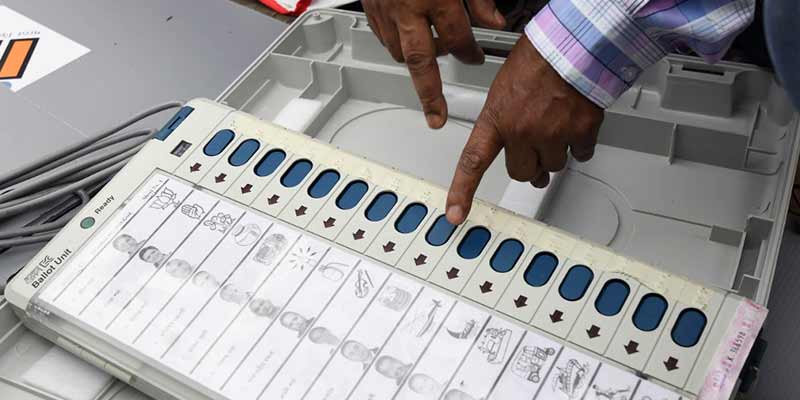- India
- Jan 28
Short Takes / Criminalisation of politics
The Election Commission (EC) has told the Supreme Court that its 2018 direction asking poll candidates to declare their criminal antecedents in the media has not helped curb criminalisation of politics, and suggested that political parties should be asked not to give tickets to those with a criminal background.
A Bench of Justices R.F. Nariman and S. Ravindra Bhat asked the EC to come up with a framework within one week, which can help curb the criminalisation of politics.
In September 2018, a five-judge Constitution Bench had held that all candidates will have to declare their criminal antecedents to the EC before contesting and called for a wider publicity, through print and electronic media, about the antecedents of candidates.
On October 10, 2018, the EC had issued a notification regarding the amended Form 26 and directions to political parties and candidates for publication of criminal antecedents.
However, a petitioner alleged that the EC neither amended the Election Symbol Order, 1968, nor the Model Code of Conduct, so the said notification has no legal sanction.
Causes of criminalisation of politics
* Political patronage enjoyed by criminals who tend to aid politicians in winning polls.
* Unholy and undesirable nexus between politicians and bureaucracy.
* Use of money and muscle power to ensure winnability in election at any cost.
* Distribution of tickets by political parties to candidates with criminal antecedents.
* Massive use of black money to win polls.
* Poverty and lack of education among the electorate.
* Absence of strong public opinion against corrupt practices.
Implications of criminalisation of politics
* It replaces the rule of law with the rule of politics, thus promoting more crimes.
* It has serious implications for the governance of any country.
* It threatens the structure of parliamentary democracy and causes deterioration of democratic values.
* It breeds more crime and corruption.
* It also results in deterioration of societal values and norms, which can eventually cause social disintegration.
Efforts by SC in this regard
In the Union of India vs Association for Democratic Reforms case, the SC held that every candidate contesting an election has to declare his / her criminal records, financial records and educational qualifications along with the nomination paper.
In the Ramesh Dalal vs Union of India case, the SC held that a sitting MP or MLA shall be subject to disqualification from contesting if he / she is convicted and sentenced to not less than two years of imprisonment by a court.
In the Lily Thomas vs Union of India case, the SC held that Section 8(4) of The Representation of the People Act, 1951, which allows MPs and MLAs who are convicted to continue in office till an appeal against such conviction is disposed of, is unconstitutional. The court held that an MP / MLA convicted for two years or above would be disqualified immediately.
In 2017, the Centre informed the SC that lawmakers convicted in any criminal case would not be automatically disqualified. A convicted lawmaker may move the appellate court to get the conviction stayed, thus allowing him or her to continue.
In the Krishnamurthy vs Sivakumar case, the SC held that disclosure of criminal antecedents (especially heinous crimes) of a candidate at the time of filing of nomination paper as mandated by law was imperative.
In the Public Interest Foundation vs Union of India case, the SC left the matter of disqualification of politicians with criminal charges to Parliament, saying that the court cannot add to the grounds of disqualification. However, it made the following directions…
* While filling the nomination forms, candidates must declare their criminal past and the cases pending against them in bold letters.
* Political parties are also responsible for putting up details of criminal cases filed against their candidates on their websites.
* The candidate and his / her political party will have to issue a declaration in widely circulated newspapers and electronic media about his / her criminal antecedents.
* Parliament must legislate on the matter to ensure that candidates with criminal antecedents do not enter public life or become lawmakers.
The SC recommendations have been criticised on the following grounds…
* Parliament, regardless of who is in power, has always been reluctant to legislate on the issue.
* Voters do not generally read the websites of political parties.
* The recommendation regarding publicity campaigns about the criminal background of candidates by political parties is counter-intuitive and there is no incentive for them to publicise something that will go against them.
EC recommendations
The EC in its proposed electoral reforms (2016) recommended that persons charged with cognisable offences should be debarred from contesting in elections, at the stage when the charges are framed by the competent court provided the offence is punishable by imprisonment of at least five years, and the case is filed at least six months prior to the election in question.
The recommendation has been criticised primarily on two grounds…
* Politicians in power will misuse this against the opposition.
* The law of the land assumes everyone to be innocent till proven guilty or convicted.
Second ARC recommendations
The Second Administrative Reforms Commission in its fourth report on Ethics in Governance (2008) made the following recommendations…
* Section 8 of the Representation of the People Act needed to be amended to disqualify all persons facing charges related to grave and heinous offences and corruption, where charges have been framed six months before the election.
* It also supported the proposal of including filing of false affidavits as an electoral offence under Section 31 of the Representation of the People Act.
Manorama Yearbook app is now available on Google Play Store and iOS App Store

